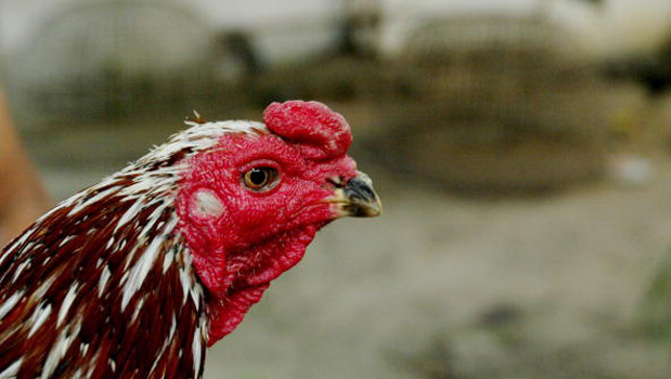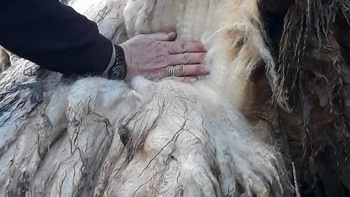
Concerning levels of lead have been found in a study of eggs laid by chooks in Auckland backyards.
The research carried out by veterinarian Liz Cowie looked at lead concentrations in the blood and eggs of backyard laying hens on Auckland properties.
Of the 30 hens blood-tested for lead, 23 showed evidence of lead exposure. And according to a toxicologist, lead concentrations are likely remnants of old, lead-based paint from the mid 1900s, and are of highest concern to pregnant women and young children.
The study also tested 23 eggs, all of which had detectable concentrations of lead in the egg yolk. Just over half - 12 - of these eggs had concentrations of lead in the yolks Cowie dubbed sufficient to warrant human health concern.
Exposure can have an adverse impact on maternal health, infant outcomes and young children's IQ levels.
The vet began investigated the issue after her experience working at an Auckland clinic dealing with a lot of birds.
"We were diagnosing a lot of lead toxicity in pet parrots - it's quite a common cause of them becoming ill," Cowie said.
When the team began testing the lead levels in chickens appearing at the clinic, they found "quite alarmingly high" lead results in their blood streams.
Midway through her masters study at the time, Cowie decided to delve into the topic for the research part of her study.
The results of the study, published late last month, found hens from Auckland properties built before 1941 were more likely to have high levels of lead in their blood and eggs, than hens from homes built after this period.
Damien Venuto with his chicken Veronica. Photo / Doug Sherring
Those chickens with higher concentrations of lead in their blood were also more likely to come from properties with weatherboard homes, than those with brick homes.
"Basically we've left a legacy of lead in the inner-city," said Cowie, who now works as a vet in Wanaka.
Telltale physical signs of high lead concentration were rare. Just one hen in Cowie's study, with the very highest level of lead, appeared "lethargic" and "a little bit wobbly".
This was even more reason for people to have their domestic hens tested - because a fowl carrying unsafe lead levels wouldn't necessarily show it.
Cowie said there was a lack of information around whether this issue was relevant to eggs sold commercially.
The research findings were surprising to Auckland chook owner and Herald business online editor Damien Venuto - who had assumed eggs laid by a free range chicken were a healthy option.
He and his wife Natalia enjoyed using the eggs their hen Veronica laid, for breakfast or to make homemade pasta on the weekend.
He would consider having Veronica's blood tested at a veterinary clinic to check her lead levels, he said.
"If it meant we couldn't eat Veronica's eggs any more, it would be a bit of a bummer, but we wouldn't get rid of her - she's part of the family now.
"In fact, she has so much attitude she might be alpha among all of us," Venuto said.
University of Canterbury professor of toxicology Ian Shaw described the amount of lead someone would consume from eating an egg a day as "vanishingly small".
However, Shaw said the levels were significant when talking about a substance as toxic as lead.
"As a toxicologist that makes me prick my ears up, because I think: that's just one component of food."
Shaw said the groups most vulnerable to lead exposure was pregnant women and children up to age 5.
Studies have proven high levels of lead could result in a small hit on children's IQ levels.
"It's a change that's not detectable in terms of, if you chatted to a child with an IQ one point lower than some other child .... but scientifically you can measure that difference."
Shaw said we should consider sources of lead and their impact.
"I don't think that means we should say to everyone, if you live in a house built in 1941 you shouldn't keep chooks."
Shaw, who used to head MPI's food safety unit, said for many, exposure to high concentrations of lead could create signs of toxicity - a reduction in red blood cell count and anaemia.
Exposure to low doses of lead could, however, build up over time.
Shaw said lead stuck around in a person's system for periods ranging from three months to 10 years, due to its ability to bind to human tissue, or incorporate itself into bone.
"If people are exposed to lead, they're very likely to accumulate it," he said.
Under the Animal Management Bylaw 2015, Aucklanders have to meet certain requirements for keeping birds and poultry.
An enclosed rainproof coop should allow for at least 30cm of roost per chicken, with a surface for pecking and a secluded nesting area.
A page on Auckland Council's site also said chicken coops should be kept clean, and at least a metre away from neighbouring fences.
The council did not have figures on how many Aucklanders kept chickens in their backyards, as owners did not need to get a licence unless they had more than six chickens.
Take your Radio, Podcasts and Music with you









